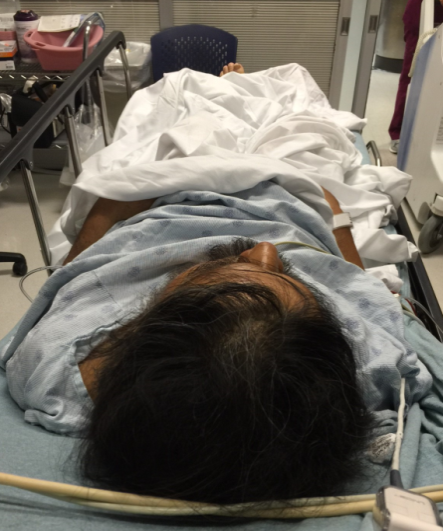ACEP ID:
- My Account
- My CME
- Sign Out
ACEP ID:

Dr. Knox sees a 52-year-old male with past history of hypertension, brought in by EMS for 2-days of fever and suprapubic pain. The pain is described as sudden onset, sharp, constant, 9/10, non-radiating, associated with dysuria, urgency, fever, though nothing improves or worsens his pain. His family states he has a history of alcohol abuse. He did not take BP medication today. He denies chest pain, shortness of breath, nausea/vomiting/diarrhea, penile discharge, hematuria, blood in stool, or IV drug use.
Vitals: HR 130, B/P 88/60, RR 20, Temp 38.5 , SpO2 100% on room air
Physical examination: sick appearing male, in moderate discomfort.
HEENT: mucous membranes dry, normal otherwise
CV: tachycardic, regular rhythm, no murmurs or rubs
Resp: clear, even and unlabored
Abd: soft, nondistended, moderate suprapubic tenderness without guarding, no CVA tenderness
Extremities: normal
Neuro: normal
The patient was given 2 liters of normal saline without appropriate response in blood pressure which remained 90/60, so a central line was placed and norepinephrine started, labs revealed an acute kidney injury with elevation in creatinine to 2.0, and urinalysis showed a urinary tract infection (UTI) without hematuria. Antibiotics were started and patient was admitted to the Medical Intensive Care Unit.
Dr. Knox records a diagnosis of “septic shock and UTI”.
ICD-10 requires a higher degree of specificity to correctly code sepsis with organ dysfunction and hypotension. The coding of severe sepsis with ICD-10 should include the source of infection, a UTI in this case, plus the code for severe sepsis. The old ICD-9 (995.92) designation of “Urosepsis” no longer exists.
The ED coder would assign the following ICD-10 diagnosis codes:
|
R65.21 |
Severe sepsis with shock |
|
N39.0 |
UTI, site not specified |
|
R30.0 |
Dysuria |
|
R50.81 |
Fever presenting with conditions classified elsewhere |
|
N17.9 |
Acute kidney failure, unspecified |
|
R10.30 |
Lower abdominal pain, unspecified |
|
F10.1 |
Alcohol abuse |
For the Evaluation & Management service, the coder would also assign a CPT code such as 99285 or 99291 for critical care.
For additional information on ICD-10 coding for emergency medicine, visit the ACEP Reimbursement page.
08/2015